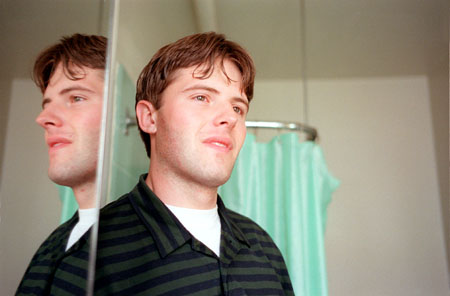Making a system that works, work better

The story of J. Justin Pasquariello’s childhood is more tabloid than fairy tale. His father died when he was an infant. His mother struggled with bipolar disorder. At best, raising Justin was a challenge for her; at worst, she endured lengthy periods of hospitalization. Justin bounced from his mother’s care in the Boston area to his father’s relatives in England and finally, at age 7, to a foster home in Arlington, Mass. When he was 9 years old, his foster family, the Pasquariellos, adopted him.
Now, Pasquariello has started a nonprofit organization, MassAFMentoring, to help other children who have the same sort of experience he had.
“The system worked really well for me,” Pasquariello explains, noting that his journey through foster care and adoption was smoother than many children’s experiences. “I want to give something back.”
MassAFMentoring, which is in its infancy, matches successful, well-adjusted adults who were adopted or in foster care with children currently going through adoption or foster care. The organization sprang from Pasquariello’s community action research project for Sociology 96, a class in democratic community organizing. Clear that he wanted to focus on adoption, he had hoped to write a book telling the stories of adopted adults. Some research in local bookstores, however, confirmed that he was not the first with such an idea.
What had not been done, Pasquariello learned through networking, was a mentoring program. And the need for it was great. Kim Stevens, a social worker with the adoption and foster care support organization Mass. Families for Kids, told Pasquariello that role models from foster care and adoption situations would motivate children who are in similar situations – children for whom success rates are typically low.
Mentoring resonated with Pasquariello, who had mentored Sean, a boy from South Boston, throughout his four years at Harvard. He knew the benefits from both sides of the equation: as a child, he wished he had known someone like him to help him with the unique issues of adoption and foster care. And as a mentor, he knew first-hand that mentors often “feel like they gain so much more than the mentee,” he says.
The program will begin this fall, after mentors are recruited at student activity fairs at Harvard and other Boston-area universities. Children in need of mentors, Pasquariello is confident, will be plentiful. He has partnered with the Renaissance Charter School in Boston, which has assured him that they can provide “more than enough kids.” His goal for the first semester is to recruit 10 to 20 mentors who will commit at least a year – preferably longer, given the importance of stability to these children – to the program.
Pasquariello has laid some impressive groundwork this spring, squeezing planning and fundraising for MassAFMentoring between his classes and jobs. The organization received a $5,000 grant from the Pforzheimer Foundation, and Pasquariello won the $1,000 Harvard Student Agencies (HSA) Social Entrepreneurship Prize. The HSA prize also provides technical support, and Pasquariello is working with a pro bono lawyer to incorporate and gain nonprofit status, which will give MassAFMentoring clout as Pasquariello seeks funding.
Pasquariello has been fine-tuning the program to ensure a positive experience for the adults and children involved. He is preparing a comprehensive orientation for mentors, including extensive materials and team-building exercises. He has educated himself in the unpleasant business of checking backgrounds and criminal records of potential mentors.
Pasquariello will make MassAFMentoring his top priority after graduation, living at home and bringing in extra cash through part-time work. His family is supportive of the project, although, he says, “they might want me to be making a little more money.” His birth mother, whom he sees three times each year, will join the Pasquariello family at Harvard’s Commencement, a symbol of the tentative interfamily relationship that is strengthening as Justin moves toward adulthood.
Pasquariello is confident that MassAFMentoring will grow and succeed, eventually serving all of eastern Massachusetts and replicating itself on campuses nationwide. He sees it as the pilot project of The Adoption Project, the name under which he is incorporating and the umbrella for his future plans: creating resources for adoptive parents, starting a summer camp, and taking another stab at that book idea.
As for his own growth and success, Pasquariello credits his upbringing. “I had a lot of people who cared about me – my biological family, my adopted family, the state,” he says. “That I had a feeling of caring and stability was really important to me. One thing I didn’t have is someone else who had been through this. That would have been really helpful.”
Contact Beth Potier at beth_potier@harvard.edu




